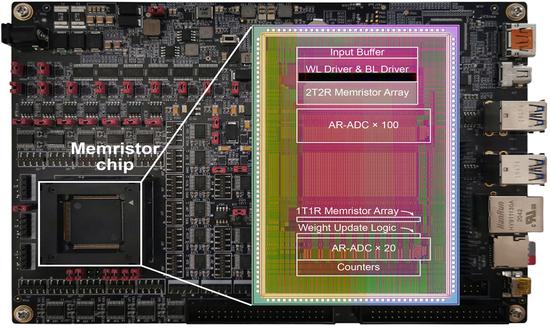 (Photo/Courtesy of the research team from the Tsinghua University)
(Photo/Courtesy of the research team from the Tsinghua University)
China's efforts to ramp up semiconductor innovation seem to bear more fruits as the Tsinghua University has successfully developing the world's first fully system-integrated memristor computing-in-memory chip that supports efficient on-chip learning, which is also energy efficient.
The chip, though still in the laboratory phase, is expected to promote development in artificial intelligence (AI), autonomous driving, wearable devices and other high-tech fields.
Developed by a team in the School of Integrated Circuits in Tsinghua University, the advanced chip has an cutting-edge advantage as it consumes energy that is only 3 percent of an application-specific integrated circuit (ASIC) system for on-chip learning, which will greatly meet demand for increased computing efficiency in the era of AI, said the research team from the university.
The research paper has been published in the September edition of "Science."
It took the team about 11 years to complete the job starting from the research on using memristors for storage application. Memristor is the fourth basic circuit component after resistors, capacitors, and inductors. It can "memorize" the passing charge after the power is turned off, and is used as a new type of nano-electronic synaptic device.
Based on nanometer-scale memristor, the computing-in-memory architecture is like a new working model of "working from home", which completely eliminates the energy consumption in commuting for data, and greatly enhance the operating speed, Yao Peng, the co-first author of the recently published paper, told the Global Times on Tuesday.
"Such advantages could have broad application in future edge computing and cloud computing," Yao said.
In addition to lower latency and smaller energy consumption, the chip can effectively protect user privacy and data security, according to Yao.
The memristor storage and computing chip is another example of China's unwavering efforts over recent years to strengthen semiconductor research and development, which is facing suppression from the US government.
China has rolled out a number of favorable policies including tax reductions and funding support to accelerate the development of its semiconductor sector, shoring up self-reliance in chips innovation and tech advancement.
In June, a subsidiary of China Electronics Technology Group Corporation (CETC) achieved the 28-nanometer full manufacturing process of ion implanter -- a leading equipment in chip manufacturing. At present, the 28-nanometer manufacturing process is a mature procedure with the widest coverage in the field of chip application.
The outline of the 14th Five-Year Plan (2021-25) for National Economic and Social Development and the Long-Range Objectives through the Year 2035 stated China will speed up the development of high-end chips.
Editor: Guo Lili

